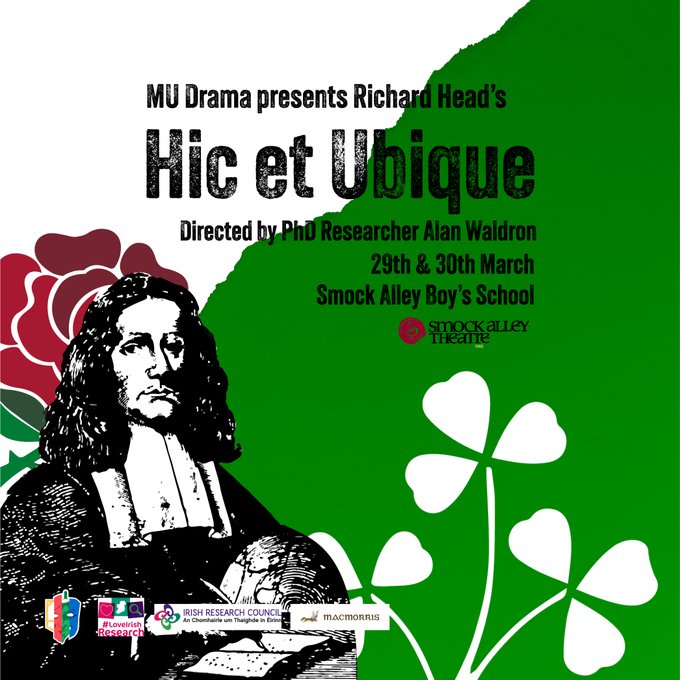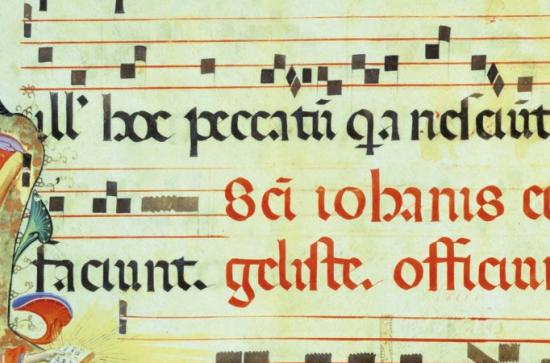

The MACMORRIS Project seeks to map the full range of cultural activity in Ireland, across languages and ethnic groups, from roughly 1541 to 1691. It is a 4-year digital-humanities project funded by the Irish Research Council, and based in Maynooth University, Ireland.
The Project is currently seeking to recruit a well-qualified applicant interested in undertaking a research degree at PhD level. The successful candidate will have at least a 2.1 degree at BA and MA level, with a strong scholarly grounding in Renaissance literature and early modern Ireland.
The ideal candidate will have with a background in one or more of the following disciplines: Early Modern English, History, Gaeilge, Modern Languages, Classics, Comparative Literature, Post-/Colonial Studies, Women’s Writing, Archaeology, Environmental Humanities, Library Science, and Information Management.
See Maynooth University website here for details on the funding, possible topics, supervision, deadline etc..
[Info copied from EURAXESS Ireland – see website for details.
The MACMORRIS project (Mapping Actors and Communities: A Model of Research in Renaissance Ireland in the 16th and 17th Centuries) is a four-year digital-humanities project funded by the Irish Research Council that seeks to map the full range of cultural activity in Ireland, across languages and ethnic groups, from roughly 1541 to 1691. It is led by Prof. Pat Palmer of Maynooth University, Department of English. The project aims to offer an inclusive account of creative, scholarly, and intellectual activity in a period of conflict, change and innovation which transformed Ireland. In doing so, it will extend, unify and redefine our understanding of sixteenth- and seventeenth-century Ireland, its place in the European Renaissance and in the wider global networks of an emerging modernity.
The project has two objectives. First, it will build a dataset of every figure from or living in or closely associated with Ireland in this period. Secondly, it will use the province of Munster as a case study and, using the biographical and bibliographical data gleaned from the dataset, it will create an interactive map to identify, geo-locate, and provide biographical and bibliographical information for the totality of cultural producers working in Irish, English, and other languages in Munster between 1569 and 1607.
The MACMORRIS Project seeks to recruit a well-qualified applicant interested in undertaking a research degree at PhD level in a way that complements the project’s objective of producing a more inclusive account of early modern Ireland. To that end, we are inviting applications from candidates with research interest in one or more of the following areas: group biography; communities of writers and learned families; patterns of patronage, knowledge exchange, manuscript circulation, and book history; patterns of settlement, conflict, and interactions between communities; translation and cross-cultural exchanges (principally involving Irish, English, Latin, and Spanish). Given the case-study’s focus on the province of Munster, an interest in cultural practices and interactions there would be particularly welcome. The ideal candidate will have with a background in one or more of the following: early modern literature, history, archaeology, library science, information management. (Co-supervision with another department, e.g. History, Gaeilge, Classics is possible.) The candidate should have an interest in applied digital humanities and feel comfortable working on an interdisciplinary team.
For details on the PhD Studentship – the funding, eligibility criteria, application deadline, and how to apply – see EURAXESS Ireland website.
For more on the MACMORRIS Project, see the Dept of English, Maynooth University website.
The 20th Meeting of the Irish Renaissance Seminar will be hosted at Maynooth University, Department of English, on Saturday 10th November 2018, in the Iontas Building.
The theme is “Earth Songs: Eco-Criticism and Early Modern Studies”
1.30 Welcome / Light Lunch
2.00 Paper Session I:
Dr Kevin De Ornellas (University of Ulster): “‘Great is the beauty of Creatures’: Godfrey Goodman Praising Animals Praising God”
Professor Pat Palmer (Department of English, NUI Maynooth): “Earthen Bodies: The Chthonic in Country House Poetry”
Chair: Dr Edel Semple (Department of English, University College Cork)
3.00 Tea / Coffee
3.15 Keynote Paper
Dr Deana Rankin (Senior Lecturer in Renaissance Literature, Department of English & Drama, Royal Holloway), “Border Disputes”
Chair: Professor Andy Murphy, School of English, Trinity College Dublin
4.15 Paper Session II:
“Dramatising Denial: A Looking Glass for London and new directions for ecocriticism”: Dr Gwilym Jones (Lecturer in Renaissance Literature, University of Westminster)
Chair: Professor Marie-Louise Coolhan (Department of English, NUI Galway)
5.15 IRS Discussion / Business meeting, followed by wine reception to mark 20th anniversary.
The organisers, Dr Stephen O’Neill and Professor Pat Palmer, acknowledge the support of Maynooth University Conference & Workshop Fund, and Maynooth University Department of English.

The Music Department at Maynooth University is pleased to host the 2018 Medieval and Renaissance Music Conference. The Conference will take place from 5th to 8th July 2018, it is envisaged that we will be able to include c.170 papers.
We welcome papers and themed session on any relevant topic, from performing and recording early music in the twenty-first century, to madrigal studies, sources studies, analytical studies, medieval and renaissance music in Ireland, to mention only a few. In view of recent political events and across the world, however, as a committee, we would like to suggest at least one topic and create space to consider the politics around researching, teaching and performing Med & Ren music in a time when racists, white nationalists (not only in the US) and xenophobes feel emboldened. How do we teach Med & Ren music courses that do not appear to be safe havens for white supremacists? That challenge ahistorical views of Med & Ren as all white (male) and Christian? What resources do we need? What stories are we not telling? What does intersectional, postcolonial, and/or anti-racist research, teaching and music-making look like or sound like in our field? What are the structural barriers to inclusivity and diversity in our field, and what can we do to remove them? We feel this is an important topic for our research fields, but it is not intended as a conference theme in any restrictive way and we would like to stress of course, that all themes and topics will be considered with equal interest.
Possible formats of presentation include, but are not limited to:
Conference languages: German, English, French, Italian, Spanish
All proposals should include:
Abstract:
Notification of acceptance: by 31 January 2018.
Proposals to be submitted to MedRen2018@mu.ie
The committee would like to support academic parenting. As such, a room with a fridge will be available as lactation room. The room is located on the first floor of Logic House (accessible via staircases), the same building where the main sessions will take place.
Antonio Cascelli (Maynooth University, Ireland)
Eleanor Giraud (University of Limerick, Ireland)
Frank Lawrence (University College Dublin, Ireland)
Melanie Marshall (University College Cork, Ireland)
Thomas Schmidt (University of Manchester/ University of Huddersfield)
For information contact: MedRen2018@mu.ie

This very exciting symposium is taking place in Maynooth University on 22 October 2016 and the full schedule is now available.
Shakespeare 400 Ireland Symposium
Shakespeare Lives Across the Island: Conversations and Celebrations
22 October 2016, Iontas Seminar Room, North Campus, Maynooth University
Schedule
10.15 || Welcome
10.30 || Keynote:
‘“They are rising, they are rising”: Shakespeare and 1916’
Willy Maley, Professor of Renaissance Studies, University of Glasgow
Chair: Colin Graham, Professor and Head of English, Maynooth University
11.15 || Coffee
11.30 || Visit to Maynooth University Library Special Collections to see 1685 Folio
12.15 || Paper Session I:
‘“Drink! Feck! Girls!” – DruidShakespeare and the Retrieval of Shakespearean Memories in Ireland’, Patrick Lonergan, Professor of Drama and Theatre, NUI Galway
Chair: Ema Vyroubalova, Assistant Professor, School of English, Trinity College Dublin
1.15 || Lunch (sandwiches and tea/coffee provided)
2.00 || Paper Session II:
‘The Hero and the Whipping Boy: Irish Shakespeares and Spensers’
Jane Grogan, Associate Professor of Renaissance Literature, University College Dublin
‘“Counted in the song”: The Taming of the Shrew and 1916 in the Irish Feminist Imagination’, Emer McHugh, IRC Government of Ireland Postgraduate Scholar, NUI Galway
Chair: Stephen O’Neill, Department of English, Maynooth University
3.45 || Refreshments
4.00 || Keynote:
‘Shakespeare, Film, Northern Ireland’
Mark Burnett, Professor of Renaissance Studies, Queen’s University Belfast
Chair: Maria Pramaggiore, Professor and Head of Media Studies, Maynooth University
5.00 || Open Discussion
This event is kindly supported by Maynooth University’s Commemorations Committee; The British Council; Maynooth University Conference and Workshop Fund; Maynooth University Department of English. For event information contact: Stephen.oneill@nuim.ie. Attendance is free.
